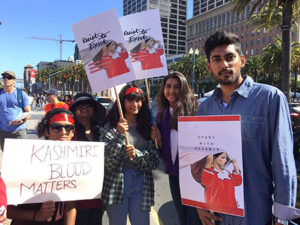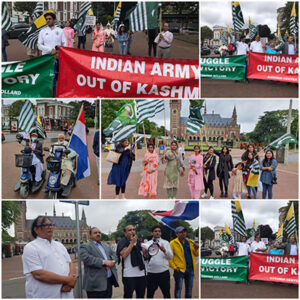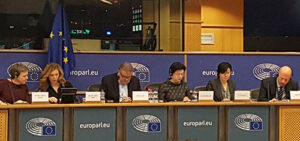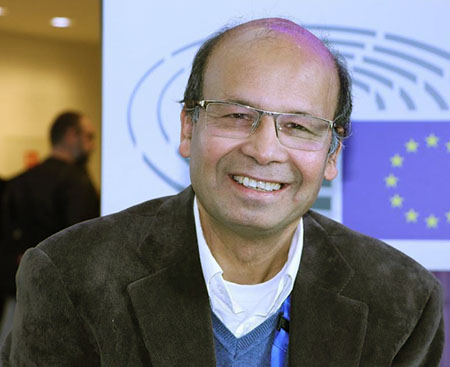
Human rights activist
Marjan Lucas is a leading human rights activist based in Nijmegen, the Netherlands. She has advocated for the rights of the Kashmiri people for more than two decades. Currently, she is working as a Political Psychologist and Consultant on behalf of the Foundation Day of the Endangered Lawyers, and a moderator in conferences and webinars on the Kashmir Dispute.
Independent human rights groups and various multilateral platforms reported that the human rights situation has drastically worsened in Indian-held Kashmir since August 5, 2019. What is your observation?
My first check is with the Kashmiris living there, what is their observation? What has changed since August 5 for them? What was and is their experience? Yes, many independent groups and platforms reported about the drastic consequences of the abrogation of Article 370, the ‘special status’ of Jammu Kashmir, on August 5, 2019. Media reported facts like the shutdown of the internet for several months, the arrest of anyone commenting on the abrogation, journalists, students, human rights activists, even mainstream politicians.
Only those who favoured, and still favour Delhi’s intervention in Indian-held Kashmir deny the facts and figures in the reports, or in the analyses in national and international media and, above all, the experiences of the people ‘on the ground.’

What can Human Rights groups and the international community do to mitigate the sufferings of Kashmiris?
Let’s first of all warn ourselves against overestimating the courage of ‘the international community.’ See the betrayal of the Belarussian people who stood up against dictatorship, see Yemen, where people suffer under the wide open eyes of the world, see Syria torn to pieces after the people’s revolt for freedom, see Afghanistan, the mess created there. See Tigray in Northern Ethiopia where women are raped by Eritrean and Ethiopian forces under the command of Nobel Peace Prize winners (PM Abiy Ahmed and President Isayas Afewerki).
You ask about ‘the international community.’ That term stands for a rather bulky basket of actors. We need to specify which section we have in mind or refer to when talking about ‘the international community.’ Politicians, diplomats, human rights groups, think tanks, civilians, media, organisations like the UN or OHCHR (Office for the United Nations High Commissioner for Human Rights), platforms such as the World Economic Forum, G7?
When it comes to politicians, I do not expect any action beyond mere declarations and statements from international political fora. Yes, the dispute over Kashmir is acknowledged by international politicians (including the European Parliament) as a persistent humanitarian crisis in Kashmir. But that’s all, nothing substantial comes next, no serious initiative to seek a breakthrough in the political status quo that could change the humanitarian situation on the ground. The diplomatic and political sectors of the international community underline that the ball is first of all in the court of the politicians in the very region of concern: India, Pakistan and Kashmir.
In Europe, the European Parliament adopted resolutions condemning human rights violations, Black Laws, military occupation and state repression in Kashmir. This is the fruit of persistent advocacy campaigns by human rights groups and diaspora activists. But such international political fora hardly get beyond these declarations, reasoning that there is more at stake then human rights of ordinary people on the ground. Geopolitics and the imperialist economy define the EU’s roadmap forward. I fear the vast majority of Members of the European Parliament (MEPs) will comply with the limits of this political frame: in 2021 the EU loves India, embraces Modi wholeheartedly.

In the remote past, Western governments were not as fond of India as they are today. India was considered to be ‘too close to socialism,’ ‘too independent,’ (read: ‘too close to communist friends like the Soviets, Cuba, African socialist states.’) The West preferred Pakistan to be its darling, if not vassal. Afghanistan was not yet the political powder keg it became as of 2001.
Since then, the new world order prevails. The Cold War with the communists was replaced by the hot war with the Taliban and Al-Qaeda. China established its global economic footprint; the Arabs shamelessly and successfully promote themselves as ‘generous financers,’ Turkey exposed itself as the one and only solid partner in halal-proof imperialism. The West (Europe, USA) is puzzled about how to respond to the worldwide eruptions of nationalism, separatism, freedom movements, extremism in every corner of the planet. Against this background, human rights violations in Kashmir are no longer the worst nightmare of international politicians.
As for the USA, simply remember Richard Holbrooke, the American diplomat who was instructed by former President Obama to seek ways forward in the Kashmir Dispute. Holbrooke was chosen for the job because of his role in fixing the Dayton Peace Agreement (DPA) in 1995 in Bosnia Herzegovina. But Holbrooke didn’t hesitate for one single second when replying: “No. No. No thank you sir!” He knew it was not merely a matter of calling relevant regional stakeholders to a round table conference: the geopolitical context of the dispute, the opposing geo-strategic and economic interests, he reasoned would be a matter of ‘No gain, only costs.’
No one else volunteered to say ‘Yes sir, let me do it!’ Obama concluded he had to relegate Kashmir to a much lower position on his agenda. And it never got back on top again.
Local civil society and human rights groups based in conflict torn regions such as Kashmir, approach international organisations like the UN and OHCHR as a beacon of hope: their attention and support would boost their spirits and hope for change ‘on the ground.’ They urge UN and OHCHR to contribute in mitigating the sufferings of civilians due to repression and human rights violations, as in Kashmir
Former OHCHR High Commissioner Zeid Ra’ad Al Hussein published the first ever OHCHR Report on the Situation of Human Rights in Kashmir in 2018, followed by a second in 2019. This could only be realised in close international cooperation and solidarity with civil society ‘on the ground.’ The reports triggered high expectations amongst the people that change could and would follow ‘from above.’ That a doctrine like the Responsibility to Protect (R2P) would have to be set out.
The UN launched the R2P doctrine in 2005 as a global political commitment to prevent genocide, war crimes, ethnic cleansing and crimes against humanity. UN General Secretary Kofi Annan wanted the world to be able to get beyond the constitutional red line of State Sovereignty in case of atrocities, as in the genocide in Rwanda and Srebrenica. It was a wonderful idea but its implementation failed dramatically.
By 2021, global awareness made headway that reality cannot simply be constructed ‘from above,’ e.g. by international military interventions to bring about regime change in ‘hostile nation states,’ or by peacekeeping missions.
At most, diplomacy and mere international presence (e.g. by the EU) in regions torn by conflict are thought to be the least possible action. And then only in those regions that matter for strategic or economic concerns, e.g. the Sahel (to monitor Boko Haram, Al-Qaeda), Ukraine (to monitor Europe’s eastern neighbour, Russia), the Horn of Africa (to prevent Arabic Islamic and Chinese imperialism from exploiting the continent’s rich natural resources).
Kashmir is hardly on that international agenda. ‘Let Pakistan and India sit together, preferably joined by Kashmiris, but that’s up to them,’ is the blunt message of Western political fora. And yes, China sometimes raises the dispute over Kashmir, but merely to protect its economic interests and not because it is concerned about the human rights of the people of Kashmir.
So far Pakistan has pretended to hold the Kashmir ticket high up in the air. But what will Imran Khan do? He also sees the world has changed. West, East, Arabs, Turkey, China: they give him heavy headaches. He might not have forgotten the Kashmiri struggle for self-determination and yes of course, he is concerned about the brutal military repression and gross human rights violations in Kashmir, but how and with whom can he seek a roadmap forward? Or will he simply put this part of his troubles in a basket to pick up some time in the future?
Thus Pakistan and the world at large make Kashmiris ask themselves: ‘Who is friend, who is foe?’ A question burning in their hearts and minds for over seven decades.
Do you think that rolling back of the August 5, 2019 measures by the Modi government should be the starting point to bring about an improvement in the human rights situation in Kashmir?
Rolling back the abrogation of Article 370, that was defined as ‘a solemn pact’ by constitutional scholar A.G. Noorani sounds simple but let’s not be naïve.
I remember a renowned Kashmiri leader explaining the pain of the struggle for self-determination. The disintegration of the former princely state of Jammu & Kashmir and takeover by Pakistan and India was like taking away a beloved doll from a bright young child and replacing it with a bruised and filthy copy, with its eyes cut out, its arms twisted, its legs broken. And on the condition that the kid would never cry again and be silent forever.
Or is your question about merely rolling back measures like the shutdown of the internet, arrest of human rights activists and Kashmiri leadership, replacement of Kashmiri civil service personnel by bureaucrats from Delhi, and so on? These have anyway to be rolled back, but let’s not forget what it is all about in essence: no substantial improvement in the human rights situation in Kashmir can be brought about as long as Kashmir remains a militarised state, ruled by Black Laws.
The ‘Modi coup’ and the August 5 measures deepened the mutual distrust between Srinagar and Delhi and might easily lead to an even harsher military surveillance and strangling of civilians in their daily life, unless Kashmir succumbs to the of post August 5 status quo, as Modi expects them to. But I am sure he’ll be proven wrong.
A lot of concerns are being expressed that India is aiming to bring demographic changes in Kashmir and make Kashmiri Muslims a minority on their own land. Is this a serious threat?
It is a serious threat, no doubt. Some scholars claim that the recent constitutional ‘coup’ will ‘open up’ Kashmir, that it will boost Kashmir’s unique heritage of Kashmiryat, the centuries-old indigenous tradition of communal harmony and religious syncretism in the Valley of Kashmir.
I fear this is wishful dreaming. See the post-August 5 reality: due to the abrogation of Article 370, anyone from all over India can settle in Kashmir. Indians can claim Kashmiri citizenship, buy property. It leads to replacements in the management and boards of institutions like universities, police, chambers of commerce. The impact of demographic changes will be felt in large sections of Kashmiri civil society: culture (heritage, language), religion (institutes, traditions) and education (curriculum, professors). The threat is especially tangible and real in the Valley, Kashmir’s socio-economic and cultural urban centre.
The struggle to grant the right of self-determination is more complicated than before due to the Abrogation of Article 370 and the demographic changes it brings about.
Modi not only ignores but also strongly underestimates the sentiment in the Valley. The last seven decades have proved the struggle for self-determination is deeply rooted in the hearts and minds of Kashmiris. The inter-generational transmission of this ideology will not be halted by outsiders like Modi.
How will the ‘indigenous Kashmiris’ respond to these developments? Will they protect and safeguard their identity through poetry, music and arts now that politics has betrayed them? How will political leaders respond?
Are there any international laws to prevent this?
I am not a lawyer; one needs judicial expertise to reply to your seemingly simple question. But no, I don’t think so. India refers to its state sovereignty and considers this a domestic affair.
India has scrapped all international and bilateral agreements and the constitutional guarantees given to Kashmiris. What’s the way forward from here?
I’d say this is an excellent question for the Kashmiri Diaspora and Kashmiris ‘on the ground’ to comment on. What do they see as a roadmap?
It will not be easy to design and implement any road forward. Searchlights will be needed to seek international alliances. The world seems fond of India, (western) nation states won’t risk being sidelined or excluded in trade-relations: economic profit and investments are the leading mantra. India hails capitalism, the imperialist free-market economy. The Indian Government built a centralist authoritarian system and decided to get rid of anything and anyone that stood in its way to be ‘an orange materialist shining capitalist nation state.’ The world (inter alia Europe, but Arabs et alia as well) likes that.
The Kashmiri diaspora, human rights groups, think tanks, Kashmiri leaders and activists in Indian held Kashmir are all confronted with this geo-political context. The one and only way forward is by preventing isolation, by ongoing international communication and interaction, by supporting Kashmiris to be heard and seen.
International people-to-people alliances, academic research and professional advocacy, publication of data (facts and figures) is all needed to persist in international solidarity as an international society. At the same time it is an essential responsibility for international human rights groups, and the Kashmiri diaspora as well, not to raise false expectations. Youth must not risk their lives simply because they expect international intervention and support due to our rhetoric here in our safe houses.
Kashmiris must persist in education and empowerment of their people.
Kashmir is only seen as a human rights issue, though it is a question of granting the right of self-determination to Kashmiris. Should rights groups and international organisations raise the issue?
Yes. Simply consider what boils for over seven decades in the hearts and minds of Kashmiris who were promised the right to self-determination in the recent past. This cannot simply be ignored or denied, especially not by those whose authority is not recognised in the region of concern (Kashmir) but enforced from outside (Delhi).
However, advocating the right to self-determination by rights groups can never be effective unless political process is developed parallel to the endeavour of rights groups and civil society communities. Kashmiri politicians who have the people’s support to take the lead on the political level have to come to the forefront. Self-determination is only partly a human rights issue — as basic people’s right. But to make it work, political leadership has to be visible.
Kashmiris are often blamed for being too divided to form a joint forum. Different ideologies and parties do have different leaders. But keeping in mind what the joint interest is (and ‘the joint enemy’) they should be urged to try to act rationally instead of merely emotionally or for matters of hierarchy, ego-exposure, heroism or profit.
In a situation of isolation, of not to be heard or seen, the risk to be vulnerable to manipulation and corruption is pervasive. Former comrades easily become enemies when locked up in caves, liberation movements in the past and present have experienced this destructive phenomenon. Having to develop leadership under occupation, trying to agree on the best way forward, can often feel like being locked up in a powder keg and playing with fire.
Are Human Rights groups and international observers allowed to visit Indian-held Kashmir?
Those who sing Modi’s song? Yes, they are welcome and get the red carpet on arrival. Independent observers who want to decide themselves whom to meet, where to go, what to observe, are not. Just have a look at the website of any Indian Embassy outside India and check the conditions to get a visa for India as a foreigner. India doesn’t want busybodies talking and walking around in Kashmir. Human rights groups know that and are well aware that they must be smart, persistent and inventive to enter, e.g. as tourists, and once thrown out, to re-enter again ‘on another ticket.’ Amnesty International, for example, send out staff of Indian origin for data collection in Kashmir and to compose and publish bold reports on perpetrators and victims of human rights violations. Others, like the renowned International Crisis Group (ICG), organised their local resources to receive the information that was analysed and exposed in their elaborate and solid reports. This cooperation between external and local researchers/activists is essential for human rights groups to be relevant indeed.
The best of course is to visit the region of concern itself, meet the people, listen, talk and see. And ‘feel’ the militarised atmosphere, notice the routines civilians have developed to avoid danger, reduce the risk of getting arrested or worse.
In my time as programme manager Kashmir, when blacklisted after my second visit in 2002, I arranged for others (e.g. lawyers, woman activists, students) to travel on my behalf, and observe and report to me upon return. This triggered new international alliances and friendships in the realm of civil society (e.g. between Dutch and Kashmiri lawyers, university students, female activists). These however cannot last very long if communication is restricted and if these alliances don’t meet ambitious expectations about substantial and sustainable impact for Kashmiri civilians in everyday life.

Last year, we could all notice that under Modi, international diplomatic or political delegations are only welcome as far as they are invited by the Indian Government. Simply remember last year’s Kashmir visit of right wing extremist conservative MEPs. However, international delegations invited by, or encouraged to go by human rights organisations were not allowed to visit Kashmir, not even high profile representatives such as the OHCHR High Commissioner upon publishing the two first ever OHCHR Reports on Kashmir in 2018/2019.
I nonetheless blame internationals for being rather lazy, not courageous enough, not persistent enough in organising monitoring missions to meet Kashmiris and support them to be heard and seen.
Persistence is essential. Against all odds.

The writer is based in Brussels and has been covering the EU and international politics for nearly two decades.



Excellent Article which covers all aspects of kashmir struggle and the difficulties suffered by kashmiries by their Occupiers. Kashmir need attention and we believe international Community will come forward and address this issue and solve it according to the wishes and aspirations of kashmiri nation.
An excellent conversation, exploring this human tragedy from every angle